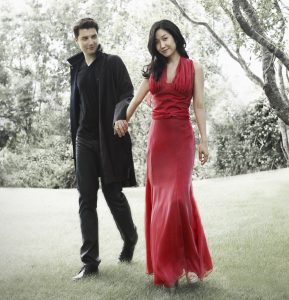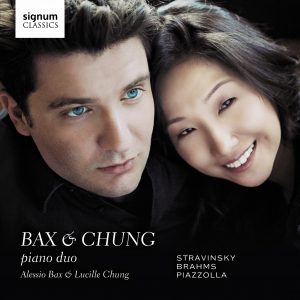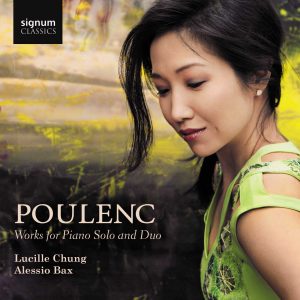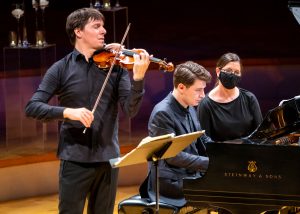Musicians love chamber music because it offers a chance to perform with friends in a warmly collegial, relatively low-stress environment. The most intimate chamber music of all is that for two pianists, especially when they perform together at the same keyboard. Some of the repertoire for piano duet is scored for two pianos, it is true: These scores call upon the musicians to sit at separate keyboards, generally facing each other.

Lucille Chung performed with the Montreal Symphony at age 10 and won First Prize in the Stravinsky International Piano Competition; Alessio Bax launched his career with wins at the Leeds and Hamamatsu Competitions and a 2009 Avery Fisher Career Grant.
“But when you’re playing four-hand music, you’re sitting right next to each other, so it’s a completely different experience,” said Alessio Bax, the Italian-born pianist who these days performs duo recitals regularly with his wife, award-winning pianist Lucille Chung. “You can feel each other’s breath, feel the energy.” Indeed, there is so little space between a piano’s low A and its high C that “there is contact when you play four-hand music,” Lucille added. “Hands, legs, arms: and this actually makes it easier to anticipate each other’s movements.”
On December 5th at the Folly Theater, Alessio and Lucille (“Bax & Chung”) bring a relative rarity to Kansas City: a whole evening of music for piano four-hands or two pianos, as part of the Friends of Chamber Music’s 48th season. And although the pianists have separate international careers performing solo recitals, chamber music, and concertos, they enjoy nothing more than meeting up several times a year to make music together.
The closeness of the duo-piano experience is one of the reasons why so many teams over the years have been either siblings (Katia and Marielle Labèque, the Kontarsky Brothers, the Wang Duo, Wolfgang and Nannerl Mozart) or couples (Lilian Kallir and Claude Frank, Arthur Gold and Robert Fizdale).
Playing chamber and orchestral music with friends and associates is hugely satisfying, to be sure, “but if I want to get deep into the nuances of music, there’s nobody I would rather play with than Lucille,” said Alessio, who has appeared several times as soloist in Kansas City but is making his joint debut with Lucille.

Bax & Chung are well-known to fans around the globe through a series of remarkable solo and duo recordings, such as this one of Stravinsky’s Petrushka.
Playing as a duo “takes a special understanding,” he said. “You really have to predict what’s going to happen, to know each other’s musicianship: to be in each other’s minds and ears all the way through.”
Music for two keyboardists, which began in the 18th century, had both practical and social value. Before the era of recordings, large-scale works such as symphonies were often published in duo-piano form so that they could be played at home by educated amateurs.
At the same time, composers began to write original duos, most notably Mozart and Schubert in the early years. (A third category is an orchestral work that is transcribed to become what is basically a whole new piece.) Brahms, Saint-Saëns, Poulenc, Debussy, Ravel, Rachmaninoff, Barber, and John Cage have all added solid works to this repertoire.
Today there are hundreds of published compositions for two pianists but relatively few full-time duos to perform them. Perhaps that’s okay: Bax & Chung bring the whole experience of their wide-ranging careers to bear when they play together.
“It’s a real source of joy and privilege to play this music,” said Lucille, who was born in Montreal, and studied at the Curtis Institute and the Juilliard School and has performed and recorded widely. “There is an abundance of riches in the repertoire.”
Alessio and Lucille’s current tour is of an (almost) all-French program, including Ravel’s arrangements of his own La Valse and of Debussy’s Prelude to the Afternoon of a Faun and Poulenc’s two-piano version of his bold Concerto for Two Pianos (which originally includes orchestra).

This Bax & Chung disc is anchored by a recording of Poulenc’s Two-Piano Concerto, which the couple will perform on the Friends of Chamber Music series.
The project culminates with the spring 2024 release of a disc of French music, which will join the couple’s widely acclaimed recordings of Saint Saëns (Carnival of the Animals), Brahms, Ligeti, and Stravinsky (a dazzling rendering of the latter’s Petrushka transcription). Each artist also has a generous catalog of solo recordings, most on Signum Classics.
“All-French” does not imply sameness. “We go from the most intimate music to big orchestral transcriptions,” Lucille said. These composers may well have all been born in France, Alessio added, “but the range is still huge: the range of emotions, of sonorities… the sound world is vast.”
When they are not touring, the happy couple and their young daughter unwind at home on New York’s Upper West Side. They often speak of their extended courtship as a You’ve Got Mail sort of scenario: They communicated via phone and email (dial-up!) from far-flung parts of the globe, until they finally married in 2004.
They began playing together early on, test-driving the Petrushka transcription and the big Rachmaninoff Suites and branching out from there. To this day it is always immediately clear, in each piece, which of them is temperamentally best suited to play Piano I and which Piano II. (And it’s different for every piece!)

At a Harriman-Jewell Series recital in October 2021, Alessio Bax stood as a musical equal to Joshua Bell in music of Ravel, Grieg, and Bloch, imbuing the piano parts with a significance and profundity one rarely hears in such a duo setting.
During the years, a chemistry developed: a sharp mindfulness that is especially useful in two-piano settings, where all they can see is each other’s shoulders and faces. “There is a lot of trust,” Alessio said. “You can look at each other, but you don’t know when the other person’s fingers are going to go down. There has to be a sort of sixth sense.”
Despite different musical backgrounds, the two manage to find an uncanny oneness. That’s because “we have the same goal, the same vision,” Lucille said. “We envision the same sound world for each piece.”
Alessio added: “The ultimate goal for any chamber music performance is not to find a common ground or a middle road, but to find the better solution. To use Lucille’s strengths and her personality, add mine to that, and then combine them. Hopefully the result is something much better and more interesting than the sum of its parts.”
—By Paul Horsley
For tickets call 816-766-1096 or go to chambermusic.org. To reach Paul Horsley, performing arts editor, send an email to paul@kcindependent.com or find him on Facebook (paul.horsley.501) or Twitter/Instagram (@phorsleycritic).